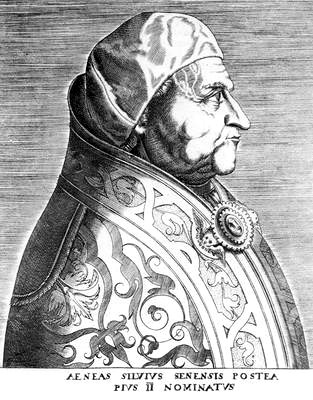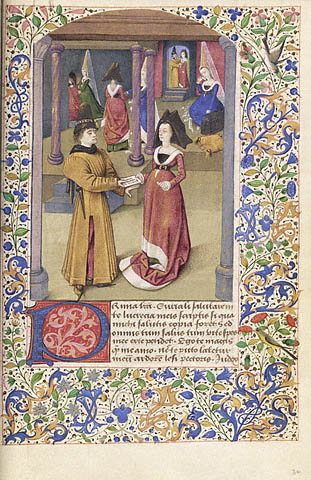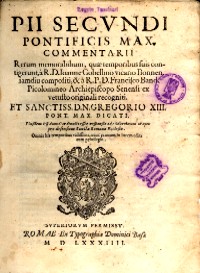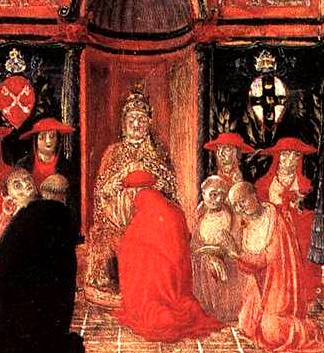|
Pius II Despite being a dissolute sinner with bastard children all over Europe, Pope Pius II left two major historical documents to commemorate his papacy - the very first papal autobiography and the papal bull, Execrabilis (sadly this is not Latin for "shitty"), which officially states that the Pope is the one and only supreme authority in the whole wide Catholic Church and could not be second-guessed by anyone else, period.
Despite being a dissolute sinner with bastard children all over Europe, Pope Pius II left two major historical documents to commemorate his papacy - the very first papal autobiography and the papal bull, Execrabilis (sadly this is not Latin for "shitty"), which officially states that the Pope is the one and only supreme authority in the whole wide Catholic Church and could not be second-guessed by anyone else, period.
Despite the fact Execrabilis was a transparent power grab, this theological breakthrough is still in effect today and it's the reason why you can't impeach a pope for such offenses as enabling and then illegally covering up thousands of cases of priests molesting young boys. Just to pick a purely hypothetical example. Pius II was born in Central Italy with the name Enea Silvia de' Piccolomini in 1405, one of 18 children. As a young man, he was quite the libertine, fathering the first few of what would eventually be a dozen illegitimate children. Although he had deep and powerful spiritual feelings, they were outweighed by his deep and powerful urge to stick his crozier into any available narthex, as the kids say. Pius was an accomplished poet and writer, eventually rising to the rank of poet laureate of the Holy Roman Empire. Although he was deeply involved in church business, he avoided the priesthood because - unlike some of his predecessors - he took the idea of a vow of celibacy seriously and didn't think he could manage to restrain his carnal impulses, in which he was said to revel. One of his most famous works was a Latin novel called De Duobus Amantibus, the Tale of Two Lovers, an erotic story that became a bestseller after Enea's ascension to the papacy. The story lays out a painfully long and chaste courtship between a man and the married woman he loves, before the two finally consummate the act in an act of passion that was described with a memorable amount of detail... but only if you keep in mind that the author later became the pope.
Lucretia was wearing a light robe which clung to her body without a wrinkle, concealing neither her breasts nor her hips, and displayed her limbs exactly as they were. Her throat was snowy white, her eyes shone with the radiance of the sun; her glance was happy, her face animated, and her cheeks like lilies mixed with crimson roses. Laughter that was sweet and modest filled her mouth. She was deep-bosomed, and her breasts swelled out on either side like two pomegranates, so that one longed to touch them.
His protagonist, Euryalus, bemoans his plight to his drinking buddies, depressed that his one true love is married to another man: "When again shall I bite those coral lips, or feel again that tremulous tongue murmuring in my mouth, or ever handle those breasts?" Whatever else one may conclude from the story, it's clear that Enea wasn't naturally disposed to restraint. In 1439, Enea became involved with an antipope (Felix V), who had broken from the church over political considerations and a desire for self-aggrandizement. He ran an alternate papacy out of Switzerland for a couple of years before everyone realized that nothing particularly interesting ever happens in Switzerland and abandoned the project. Felix was excommunicated, but Enea emerged from the fiasco relatively unscathed. He reconciled with Rome in 1445 and was finally prevailed on to become a priest and abandon his wanton ways (overtly, at least). Thanks to his political connections, he became a bishop almost immediately and acted as a diplomatic envoy to Roman emperor for several years before becoming a cardinal. In 1458, amid the miasma of arcane Renaissance politics, Enea became Pope Pius II, beating out a field of competitors for the pontificate that included a scheming French cardinal named Guillaume. Pius, who became the first pope ever to write a memoir, recorded the memorable details of the conclave that eventually elected him: A large group of cardinals gathered in the latrines. Here, as if in a secret, private meeting place, they worked out a plan to elect Guillaume pope, binding themselves with oaths and written pledges. (...) A perfect place to elect such a pope; where better to strike a filthy bargain than the latrines! According to Pius, the tide turned against the toilet-mongering cardinals when Pius himself gave a speech whose brilliance so transfixed the members of the assembly that they couldn't budge from their seats, offer an objection, spit or even blink. This account may be a trifle exaggerated, but Pius did end up winning the election.
The intention of the crusade was to liberate the parts of Europe under Turkish Muslim rule. To facilitate this, he attempted to create a new version of the Knights Templar to lead the effort, the Knights of Our Lady of Bethlehem, but there is no record that the organization ever existed (unless as a secret society undertaking a vast global conspiracy). Insult led to injury. When Pius summoned the princes of Christendom to discuss his crusade, hardly anyone showed up. Those who bothered to attend were not enthused about the concept, mostly because they all had different opinions about who should be in charge. A few thousand troops were finally offered, after much handwringing, but they neglected to report for duty. The imperial papacy had apparently come to an end. This infuriated Pius, who in part blamed the interference of the various ecclesiastical councils that had been tools during 500 years of political intrigue, which had ultimately destabilized the papacy and contributed to the various antipope movements.
Although the papacy hadn't quite seen the end of political turmoil, Execrabilis (which means "accursed") eventually became the rule of law, setting a precedent that future popes would cite as their mandate to ignore the opinions of all their underlings, priests, bishops, cardinals and the lowly lay people. (Although the declaration only decrees that the pope is superior to any council of bishops, some later interpreted the bull as voiding all such councils, whether or not they have the sanction of the pope. This has been used as an argument against the Vatican II reforms, but it's a stretch.) When the Crusade fell apart, Pius made a sporting effort to convert the Islamic Sultan to Christianity, but that effort failed as well. Finally, in one last effort to muster some enthusiasm, Pius resolved to lead the Crusade himself. He marched out to where his troops were supposed to gather and died without ever seeing his army. In the end, Pius was destined to be remembered as a lover, not a fighter. He probably would have preferred it that way.
|
 The eroticism of the story is frankly overrated, even by the standards of the day, but its authorship made it notorious. At times, Enea's protagonists engage in protracted acts of metaphor which are barely recognizable as sex - "They spread their sails for Cythara; and when Venus wearied of the journey, Ceres refreshed her, and Bacchus." But Enea wasn't always so oblique.
The eroticism of the story is frankly overrated, even by the standards of the day, but its authorship made it notorious. At times, Enea's protagonists engage in protracted acts of metaphor which are barely recognizable as sex - "They spread their sails for Cythara; and when Venus wearied of the journey, Ceres refreshed her, and Bacchus." But Enea wasn't always so oblique.  The politicking didn't end when Pius became pope. In the great tradition of the papacy, Pius decided to throw a
The politicking didn't end when Pius became pope. In the great tradition of the papacy, Pius decided to throw a  In response, Pius issued his papal bull, Execrabilis, which ruled that the pope was the ultimate authority in the Catholic Church and could be gainsayed by no one. The decree was a lot more colorful than a typical papal bull, condemning the councils as "pestiferous poison" and "detestable".
In response, Pius issued his papal bull, Execrabilis, which ruled that the pope was the ultimate authority in the Catholic Church and could be gainsayed by no one. The decree was a lot more colorful than a typical papal bull, condemning the councils as "pestiferous poison" and "detestable".